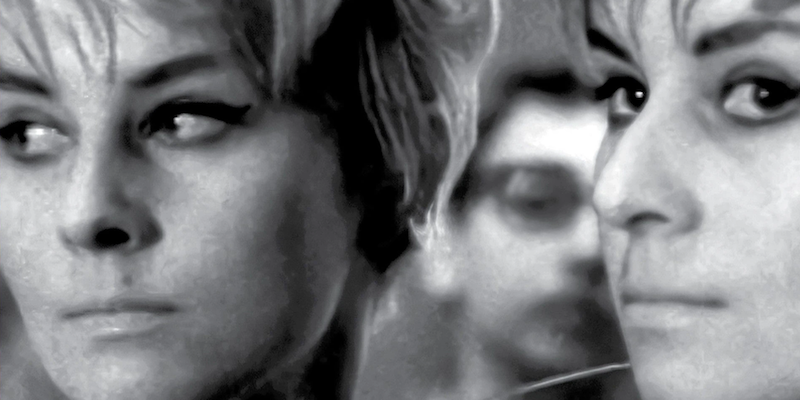5 Book Reviews You Need to Read This Week
“Levine is a gifted performance artist of literary fiction—part French existentialist and part comic bomb-thrower.”

Article continues after advertisement
This week’s feast of fabulous reviews includes Sanjena Sathian on Salman Rushdie’s Knife, Christian Lorentzen on Vinson Cunningham’s Great Expectations, Lydia Millet on Stacey Levine’s Mice 1961, Hannah Gold on Helen Oyeyemi’s Parasol Against the Axe, and Ron Charles on Sunjeev Sahota’s The Spoiled Heart.
Brought to you by Book Marks, Lit Hub’s home for book reviews.
*
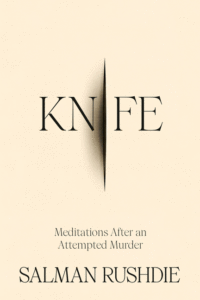
Article continues after advertisement
“Which Rushdie wrote Knife? Is this new, buzzy memoir the work of a man securing his legacy? Or of a man reflecting on a writing life interrupted by stranger-than-fiction events? Knife is in part about—and in some sense itself is—a battle between the two most prominent Rushdies: Great Writer and Great Man, artist and advocate, private person and public figure. At its best, the book speaks to what it has been like for someone who thinks of himself as a writer by vocation and a free-speech activist by conscription to try to make art, not to mention a life, under extraordinary circumstances. At its worst, Knife can leave the reader feeling unsure of which Rushdie it speaks for, which Rushdie we should remember …
Given the circumstances, it is miraculous that anyone would manage to write anything coherent about such a recent trauma, let alone anything good. And Knife is often good. The first chapter, in which Rushdie recounts the attack itself, contains some of the most precise, chilling prose of his career … Indeed, Knife is at its strongest when Rushdie-the-novelist narrates the material of his own life … The rest of Knife is less precise than the material about the A. The word meditations in the title may be a preemptive defense against the accusation that, as a complete work, Knife is somewhat inchoate. But the lack of clarity in Knife’s mission can feel distracting … Rushdie need not have more deeply inhabited Matar, but there is complex social context around the man and his radicalization that Knife might have explored more fully to truly comprehend the author’s near death …
That ability to make history intimate is his greatest talent as an artist; the gift predates the fatwa. It may be cruel to expect Rushdie to craft something that both addresses society and feels artistically transcendent in the face of such a personal crisis. But he has managed this feat before … If Knife sometimes feels like it was hastened to press, if its conclusion reads like an epiphany forced on deadline, it’s probably because Rushdie, reasonably, wants to spend his remaining years on the struggle he actually chose, not the one he was coerced into.”
–Sanjena Sathian on Salman Rushdie’s Knife (Vulture)
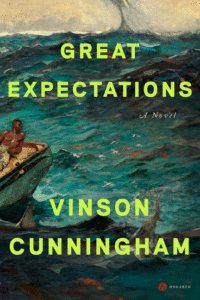
Article continues after advertisement
“One of the things that always bugged me about Obama—aside from his extension of his predecessor’s neoconservative foreign policy, the bonanza for private health insurers in Obamacare, the supine orientation toward financial institutions, and so on—was his hostility toward cynics. In his usage, the word tended to designate anyone opposed to him, his policies, or hope itself. He generally meant Republican naysayers (right-wingers took notice: the Cato Institute issued an item on Obama’s ‘War on Cynicism’), but also disaffected millennials from among his original core of supporters, the recently hope-deficient …
David Hammond, the narrator of Vinson Cunningham’s not quite ironically titled first novel Great Expectations, isn’t exactly a cynic, but he is possessed of a pessimism beyond his years … That he has waited sixteen years to write a book drawing on his experience and chosen to write a literary novel rather than a résumé-bolstering memoir or a Beltway potboiler speaks to an idealism divorced from politics. And though the novel obviously folds in autobiographical material and David mentions several times a vague ambition to become a writer, I wouldn’t call it autofiction in the way the term has been applied to Karl Ove Knausgaard, who framed My Struggle as an act of confession, or to Ben Lerner, who draws attention to his similarities with his alter egos even as their stories deviate from his own biography. Cunningham is up to something more old-fashioned …
Cunningham’s novel partakes of three modes—the political, the personal, and the critical—and some of its most fascinating moments occur at the intersections … Most novels about young people are written by young people and tend to rely on comic exaggeration, which tyro novelists lean on to cover for their lack of experience. Coming to the art form in middle age, Cunningham doesn’t need that crutch. His humor is hard-earned and dry.”
–Christian Lorentzen on Vinson Cunningham’s Great Expectations (Bookforum)
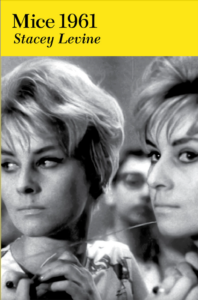
Article continues after advertisement
“As I read Stacey Levine’s new novel Mice 1961—which is not about small, intelligent rodents but about two young sisters and their live-in housekeeper—I laughed aloud many times. It was a startled, delighted laughter produced not by commonplace tricks of humor but something singular to Levine’s writing: a brilliant chemistry of alienation and familiarity I’ve never seen anywhere else. Cracking open the novel, you may at first feel like a stranger in a strange land. But stick with it, because this is a rich and surprising country of curious hilarity, skewed lighting, awkward pratfalls and ludicrous conversations …
Mice is victimized and insulted, often with a viciousness so stupid it provokes the helpless, half-guilty laughter that is Levine’s particular genius. Still, though she’s unnecessarily pitied and irrationally feared by a diverse suite of community members—and tormented by the foolish teens—Mice maintains an odd equanimity … Levine’s habit of pairing unlikely adjectives with her nouns, causing semantic stutters in the flow of the text, generates a Brechtian distance that calls attention to language and to the artifice of prose…But these metafictional gestures are modestly, expertly handled. Far from interrupting the suspension of disbelief, they create a droll idiom so seductive it cradles the narrative world rather than breaking it open … Levine…is a gifted performance artist of literary fiction—part French existentialist and part comic bomb-thrower.”
–Lydia Millet on Stacey Levine’s Mice 1961 (The Washington Post)
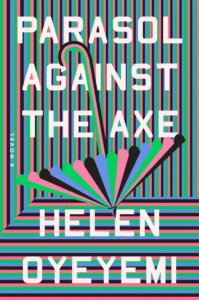
“The rate at which Oyeyemi invents thickets of problems without answers, obstacles to bounce over, mysteries to shrug at, is frantic, like in those dreams where you have to run very fast in order to move slowly … One becomes accustomed to precisely nothing in Oyeyemi’s difficult marvel of a novel. Its plot is both fascinating and beside the point, branching and digressing in a fashion the author’s fans will anticipate but can never fully prepare for. Readers must pay careful attention to chains of events if they hope to find their way through Oyeyemi’s maze. But just following these breadcrumbs won’t suffice.
Article continues after advertisement
When the possibility or usefulness of knowing what’s going on reaches its limits, the novel’s ever-churning style can save the day—or be resisted at the reader’s peril. Its hallmarks include: side-eye, brazen interruptions, cool dismissals, trickery, idling, cheek, non-apology apologies, and doublings-back. Whereas persuasion, order, manipulation (emotional or otherwise), moralizing, and prescriptions of any kind have no place in the novel’s sentences or construction and are often looked down upon by the characters themselves … Characters introduced before their time shuffle back into their rooms and close the door behind them. Information is divulged too late for it to matter. Prague itself is an unfathomable bureaucrat, corrupting its files and fudging its English clichés …
Parasol is captivating precisely because it is not believable. Instead, it is aware of itself thinking. But not in an annoying, intellectually domineering way; Oyeyemi is more interested in the imagination’s unjustifiable demands than demonstrations of her own brilliance.”
–Hannah Gold on Helen Oyeyemi’s Parasol Against the Axe (Bookforum)
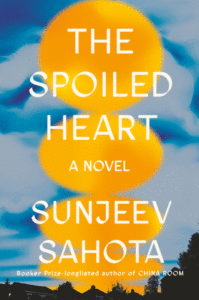
“Me again, banging on about Sunjeev Sahota. I won’t stop until you read him … His new book, The Spoiled Heart, finds a timeless imprint in the hot metal of the moment. The story explores identity politics, that complicated intersection of race, gender and sexual orientation that, depending on your point of view, promotes equity or sanctifies discrimination. It’s the kind of treacherous novel that Philip Roth might have written—and almost did with The Human Stain. But I already regret that comparison. Although Sahota is just as clear-eyed as Roth about the crosscurrents of tribalism that contort our lives, his tone is always plaintive. No matter how deeply he sympathizes with characters’ grievances, he never sweats with the kind of rage that fueled Roth …
Article continues after advertisement
Such is the unstable moral foundation of The Spoiled Heart. Sahota draws up an admirable protagonist and then lets our sympathy curdle in the fetid atmosphere of his ambition … Along the way, Sahota throws so many disparate parts into this story that it’s something of a miracle when they begin to coalesce—like a box of gears and springs tumbling down the stairs and coming to rest in the shape of a clock …
In fact, the only ham-handed element in The Spoiled Heart is a subplot involving Helen’s teenage son, Brandon. He was once fired from a dining services job after a wealthy Black student concocted a racist offense and sicced the woke mob on him. This melodrama of White innocence and manufactured racial protest feels like one of those reactionary yarns recycled on Fox News and the op-ed pages of the Wall Street Journal. Or maybe that anecdote is a crucial reminder that we’re receiving these details second- and third-hand, after they’ve been picked over and processed into stories that make sense to the various tellers.”
–Ron Charles on Sunjeev Sahota’s The Spoiled Heart (The Washington Post)
Article continues after advertisement









